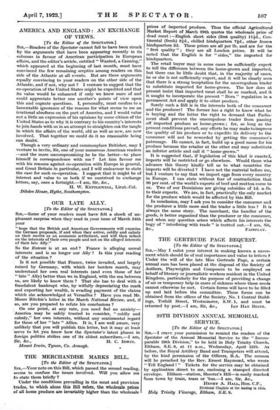THE MERCHANDISE MARKS BILL.
[To the Editor of the SPECTATOR.] SIR,—Your note on this Bill, which passed the second reading, seems to confuse the issues involved. Will you allow me :to state them briefly ?
Under the conditions prevailing in the meat and provision
trades, to which alone this Bill refers, the wholesale prices of all home produce are invariably higher than the wholesale
prices of imported produce. Thus the official Agricultural Market Report of March 29th quotes the wholesale price of dead meat :—English short sides (first quality) 110., Con- tinental (fresh) 81d., chilled hindquarters 7fd., other frozen hindquarters 5d. These prices are all per lb. and are for the "first quality " ; they are all London prices. It will be noted that the English is for "sides," the imported for hindquarters.
The retail buyer may in some cases be sufficiently expert to tell the difference between the home-grown and imported, but there can be little doubt that, in the majority of cases, he or she is not sufficiently expert, and it will be clearly seen that there is a strong temptation for the unscrupulous trader to substitute imported for home-grown. The law does at present insist that imported meat shall be so marked, and it is sought to incorporate the present " Dora " regulation in a permanent Act and apply it to other produce.
Surely such a Bill is in the interests both of the consumer and the producer! The former has a right to know what he is buying and the latter the right to demand that Parlia- ment shall prevent the unscrupulous trader from passing off imported produce as home-grown ; for, so long as the present conditions prevail, any efforts he may make to improve the quality of his produce or to expedite its delivery to the consumer will not be rewarded by getting the consumer's patronage. He cannot, in fact, build up a good name for his produce because the retailer at the other end may substitute an inferior article and call it "home-grown."
It is suggested that, if legislation of this kind is enacted, imports will be restricted or go elsewhere. Would those who advance this theory kindly tell us to what countries the imports will be diverted ? I have not the material before me,, but I venture to say that we import eggs from every country in Europe. I can state without fear of contradiction that 90 per cent, of the world's exports of beef and mutton come to us. Two of our Dominions are giving subsidies of id. a.lb. to their exports. We are, in fact, practically the only market for the produce which would be affected by this Bill.
In conclusion, may I ask you to consider the consumer and the producer a little more and the trader a little less ? It is always the same story. The merchant, the handler of the goods, is better organized' than the producer or the consumer, and when any question arises which affects his interests the bogy of " interfering with trade" is trotted out.—I am, FAIRPLAY.










































 Previous page
Previous page